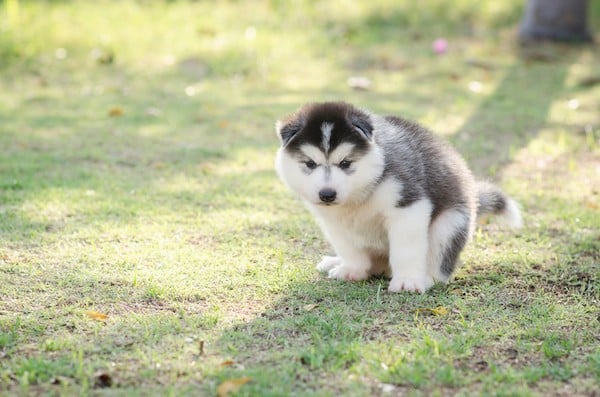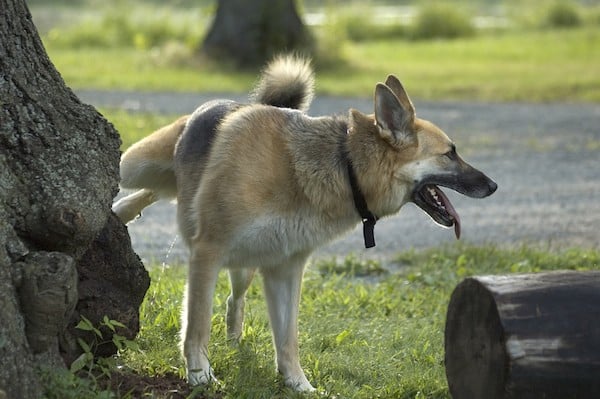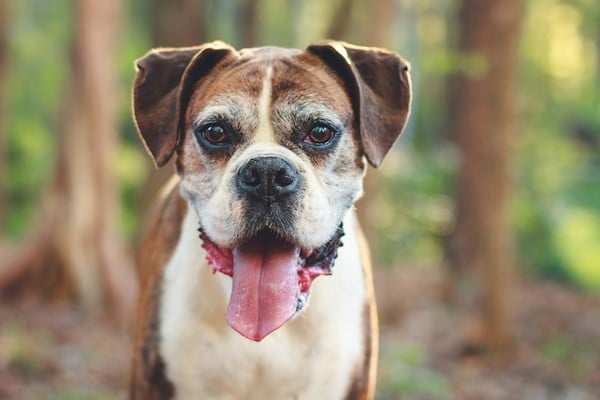House soiling is one the most common reasons people relinquish dogs to shelters. Relieving oneself on the kitchen, living room, or bedroom floor is just not an option for any dog who hopes to live with humans.
Fortunately, housetraining isn’t hard to teach. Dogs have a natural instinct not to go to the bathroom where they sleep. The trick is to teach your dog that the entire house falls under this category.
Housetraining is a little different at each of the age categories.
Puppy

Puppy pooping by Shutterstock.
Puppies are different from one another. My Corgi puppy, Nigel, took five months to housetrain. My mixed-breed puppy, Mookie, is almost completely housetrained at 4 months. My friend Tracy has a mixed-breed puppy named Denali who was reliably housetrained by 12 weeks.
Housetraining a puppy requires patience and persistence. You want the act of eliminating outdoors to become a habit that is so ingrained, it’s the only option. Here are some pointers.
- Crate train. A crate is your best friend when housetraining a puppy. Whether it’s an all-wire enclosure or a plastic airline-type kennel, the crate will serve as your puppy’s den and teach him to control his bladder and bowels. He should be in his crate at night when you’re sleeping, when your not home, and when you can’t supervise him. He should not stay in the crate longer than four hours at a time — even less if he’s a very young puppy since it will be harder for him to hold it for that long.
- Be consistent. Housetraining a puppy is a tough job that means being on call 24/7. If you want your pup to learn to go to the bathroom outside, make sure he has the opportunity to do so every time he needs to eliminate. That means taking him out frequently — as often as every hour during the day if he’s very young — so he can develop the habit of going outside. If he’s allowed to eliminate indoors, it will become his habit.
- Be positive. Let your puppy know that going to the bathroom outside is the best thing ever. Tell him how great he is when he does his business in the right place. Give him good, gentle praise when he’s pottying outside so he knows he’s making you happy.
- Never punish. The old notion of rubbing a puppy’s nose in his mess to punish him is not only cruel, it’s harmful. He won’t understand why you’re doing it and will become afraid of you, and you’ll damage your relationship with your dog for no good reason. Instead, use positive reinforcement when he does it right, and learn from the accident. You might need to take him out more frequently, or you might be giving him too much freedom in the house.
Adult

Dog peeing on a tree by Shutterstock.
When I adopted 6-year-old Candy at age 6 from the a local shelter, I was prepared to deal with having to housetrain an adult dog. I was thrilled beyond belief that she was already housetrained. In the more than one year I’ve had her, she has never had an accident in the house.
If you have given a home to an adult dog who hasn’t been taught the rules of going to the bathroom outside, be patient and positive. Don’t give up hope even if it’s taking a long time. Keep at it, and you will eventually succeed.
Here’s some adult dog housetraining advice.
- Limit freedom. Your dog must earn the right to roam the house. If he’s not housetrained, he needs to stay in a confined area when you’re not able to supervise him. A crate or exercise pen should do the trick, or even a bathroom or kitchen blocked off with a baby gate. Most dogs don’t want to be in close quarters with their own waste, so your adult dog will be less likely to go to the bathroom indoors if you keep him confined.
- Designate a spot. Always bring your dog to the same spot each time you want him to go. This will help him understand where the bathroom is, and the smells will remind him that this is the potty area.
- Take frequent breaks. Because your dog doesn’t know she’s supposed to go the bathroom outside, you have to teach her this by taking her outside a lot in the hopes she will have to go. When she does, praise her gently while she’s going and enthusiastically when she’s done.
Old but not out

Senior dog by Shutterstock.
By the time a dog has reached his senior years, he should be housetrained. Some older dogs can have lapses in their training, though, like my parents’ Pomeranian, Monique, who seems to sometimes forget that she’s supposed to go outside. Dogs like this need to start their training all over. Some senior dogs need to go out more often just because they can’t hold it as long.
If you adopted an older dog who appears to be confused about where he should be going — he might not have learned or might be confused because of the changes in his environment — he might need help learning the rules of the house. Keep these tips in mind.
- Understand his limits. Just as with a young puppy, senior dogs often can’t hold their bladders and bowels for very long. The more often you take him out, the faster he will get into the habit of doing his business in the yard and not in the house.
- Confine him. A senior who is not housetrained needs to be kept in a confined area when you’re not able to watch him. He’s less likely to eliminate if you have him in a crate.
- Check for health problems. If your older dog suddenly starts eliminating in the house after years of doing it outside, he’s likely having health issues. Some common conditions common in older dogs can make it hard for them to control their bladder and bowels. If your dog starts having problems in this area, take him to your vet for a checkup.
No matter your dog’s age, housetraining can be challenging. But whatever you do, don’t give up hope. Keep working on it. Eventually, your puppy, adult, or senior dog will catch on.
The post How to Housetrain a Dog at Any Age appeared first on Dogster.
No comments:
Post a Comment